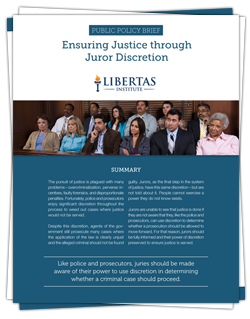Authored by Josh Daniels, Director of Policy
 The pursuit of justice is plagued with many problems—over-criminalization, perverse incentives, faulty forensics, and disproportionate penalties. Fortunately, police and prosecutors enjoy significant discretion throughout the process to weed out cases where justice would not be served.
The pursuit of justice is plagued with many problems—over-criminalization, perverse incentives, faulty forensics, and disproportionate penalties. Fortunately, police and prosecutors enjoy significant discretion throughout the process to weed out cases where justice would not be served.
Despite this discretion, agents of the government still prosecute many cases where the application of the law is clearly unjust and the alleged criminal should not be found guilty. Jurors, as the final step in the system of justice, have this same discretion—but are not told about it. People cannot exercise a power they do not know exists.
Jurors are unable to see that justice is done if they are not aware that they, like the police and prosecutors, can use discretion to determine whether a prosecution should be allowed to move forward. For that reason, jurors should be fully informed and their power of discretion preserved to ensure justice is served.




